About
- The EVC's Vision
- Collective Impact at UC San Diego
- Steering Committee
- Contact Collective Impact
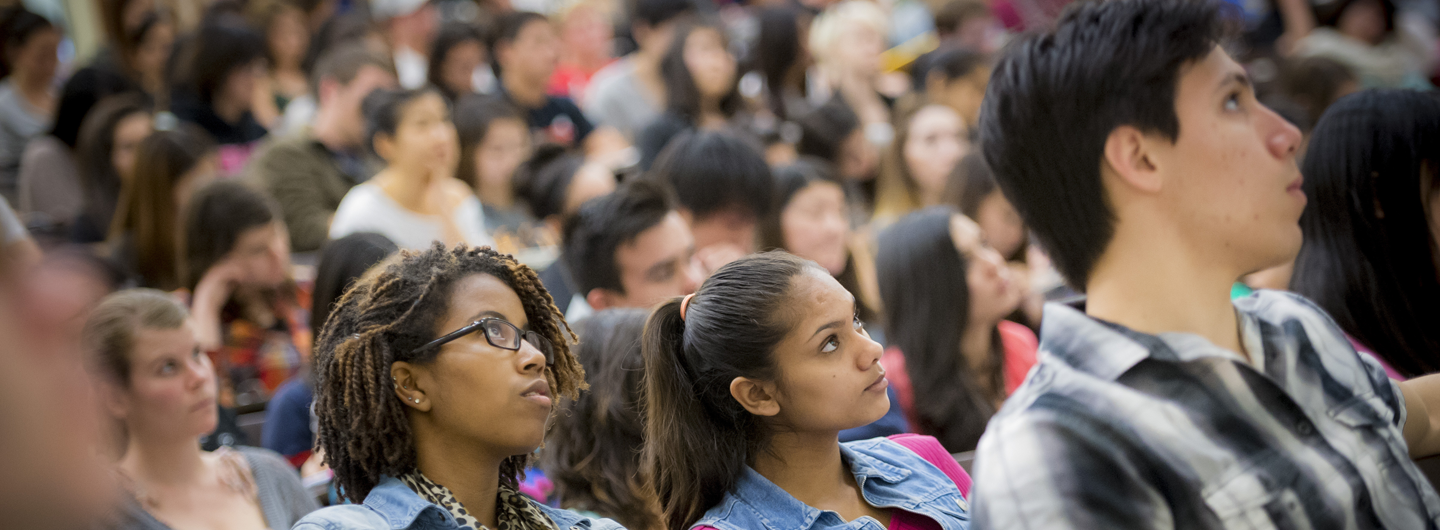
In recent years, UC San Diego has been widely recognized for tremendous accomplishments in research, innovation, and the arts; employing a successful cross-campus collaboration to address the pandemic in Return to Learn; for compassionate support of vulnerable communities; and for providing an outstanding education to an increasingly diverse student population. During the same period, an array of reviews, including our WSCUC reaccreditation report and data from the UC Undergraduate Experience Survey (UCUES), Staff@Work, and Academics@UCSD surveys, have consistently highlighted key opportunities for improvement. The largest opportunity that the various reviews have identified is for us to unify our many efforts to make members of the university feel informed, mentored, valued, heeded, and enabled to do their best work.
Indeed, one of the most striking lessons from our response to the pandemic has been the effectiveness of the many instances where individuals and groups from many parts of the university came together to jointly transition previously separate efforts to the remote environment or to create innovative solutions to unfamiliar challenges. The examples span everything from teaching and summer programming to student recruitment and onboarding to health and safety initiatives to communication and strategic planning. They demonstrate that by uniting our efforts, we can achieve our aspirations for improving the university experience and promoting student, staff, and faculty success.
Working collectively and coherently to become a more inclusive, student-centered, research-focused, service-oriented university, Collective Impact (CI) will be used to:
As our university has rapidly expanded, various schools and offices have created unique programs that address the needs of individuals in particular disciplines, career paths, or personal circumstances. Yet, these valuable programs cover only a fraction of the Triton community. To erase the equity gaps that divide us, we must find ways to reach everyone.
Academic Affairs invites you to join “Erasing Equity Gaps via Collective Impact” – an initiative to align and enhance the various support systems, inclusivity programs, and equity-driven practices at UC San Diego that have the potential to jointly improve the experience, climate, and performance for all of our undergraduates, graduate students, staff, and academics.
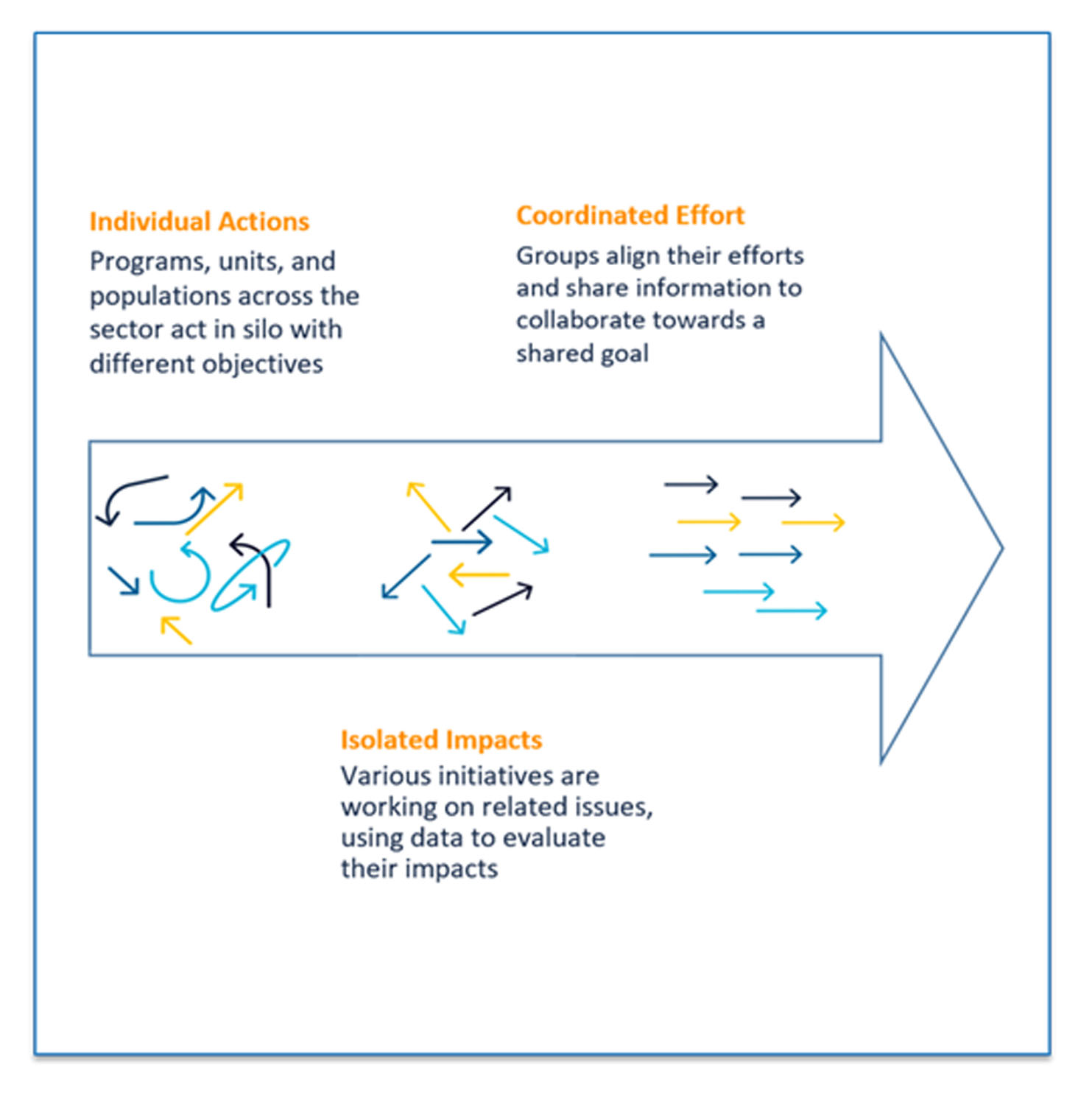
Employing the CI framework at UC San Diego doesn't mean creating new work for those working to erase equity gaps. Instead, the goal is to work in a coordinated, collaborative way toward agreed-upon goals that will be measured using the same metrics. In short, it will be doing your same work in a new way.
Our campus is not unfamiliar with the equity gaps that continue to exist on our campus, despite the work of many individuals to address these inequities. Our recent experiences dealing with the pandemic have demonstrated that the collective power of our concerted actions amplifies the effect of these individuals' work.
In January 2022, Governor Gavin Newsom released his budget proposal, which pledged to deliver five years of a 5 percent general fund increase for the UC and CSU systems, IF we close equity gaps.This is our chance to make monumental progress on erasing these gaps by applying a collaborative approach more widely.
Collective Impact only works if there are shared goals and guidelines for how we work together most effectively.
Shared Overarching Goals
Habits of Purposeful Collaboration
The key elements of the collective impact model are:
If we leverage existing initiatives by creating collective impact networks among programs and fostering communities of practice among individuals, we can scale and strengthen the onboarding, mentoring, training, and support systems that have the power to dramatically improve experience, climate, and performance for all. In doing so, we will also more appropriately recognize and reward the work involved, which has far too often been invisible.
This approach is consistent with our university history, our spirit of innovation, and our inclusive aspirations. Its collective orientation will encourage individuals to flexibly address local needs, while staying connected for maximum impact. The focus on assessment will push us to blend the best of our prior in-person experiences with the virtual tools we have learned this year. And its drive for greater reach and inclusivity will push us to reach campus-wide scale.
Together over the past several years, we have developed shared goals outlining our aspirations for UC San Diego and some principles for how we can partner most effectively. These will serve as essential guidelines for our work in a collective impact framework going forward.
This video explains how the Collective Impact framework can be used to tackle a wide range of issues.
The five phases of Collective Impact help to build a sustainable framework that is customized to our campus community. We have already completed the first two phases of Collective Impact for the existing Working Groups, and we are currently in the phases 3 and 4.
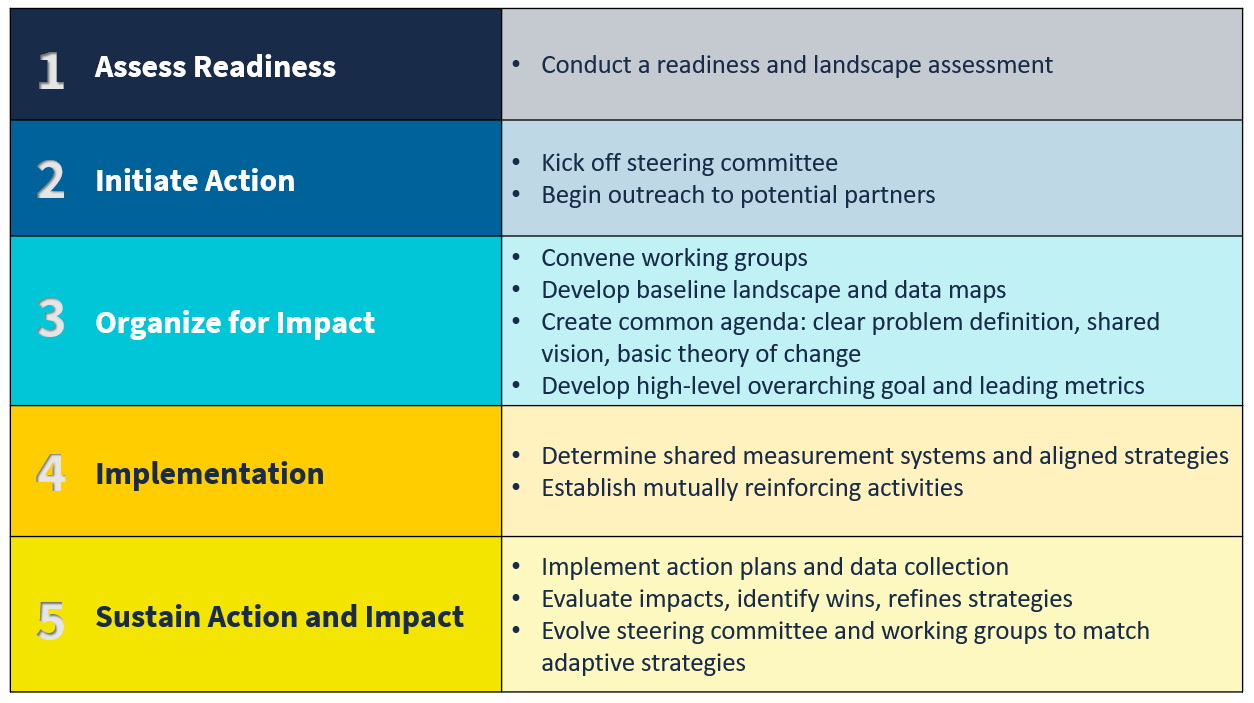
Part of implementing the Collective Impact model includes developing a network. In this model, stakeholders are organized into a network that builds capacity for more efficiency and greater impact.
At UC San Diego, the Collective Impact network elements might map onto campus like this:
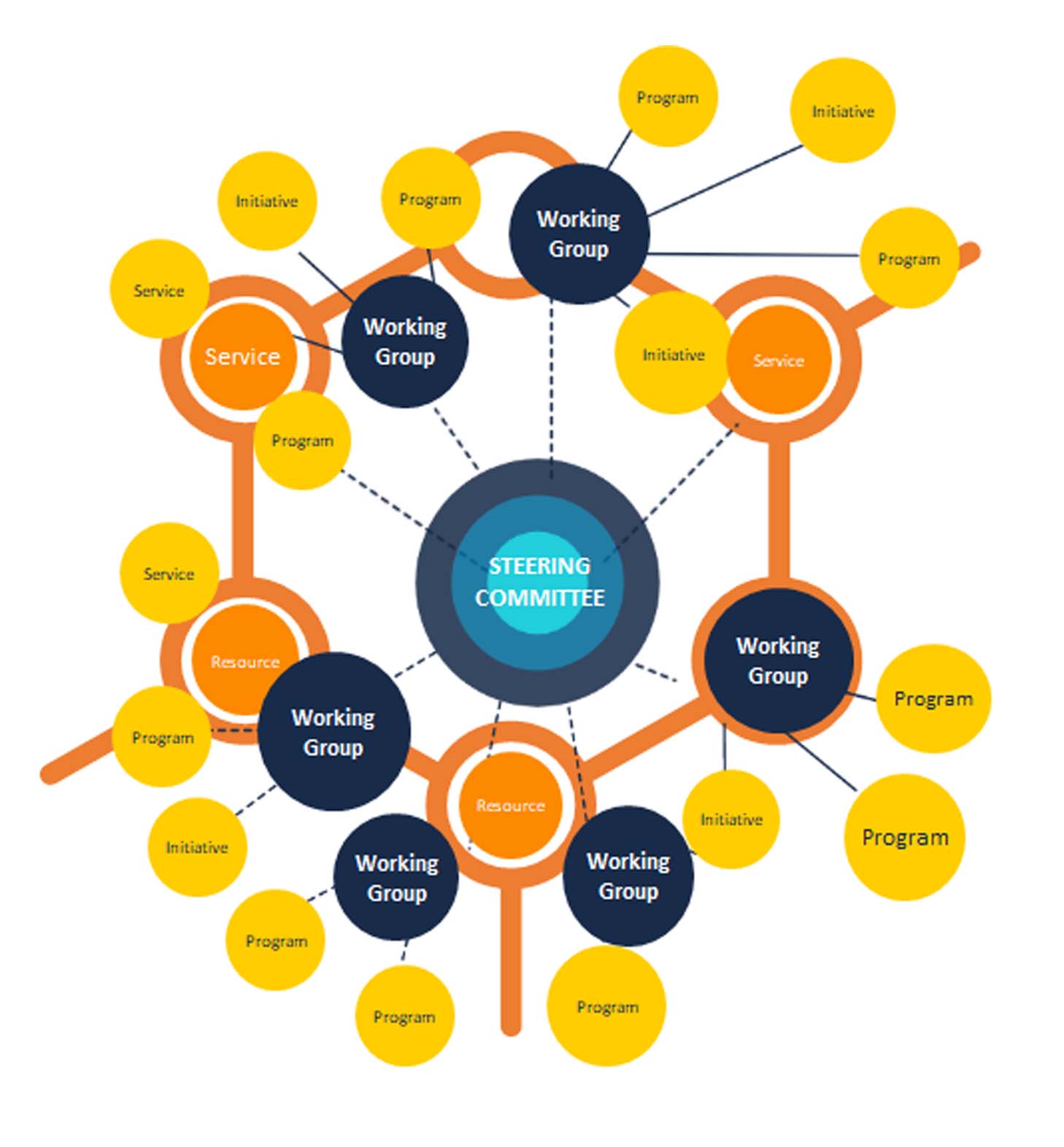
In summer 2019, university community members started working together to more clearly define our aspirations and how we can best pursue them. The initial conclusions are captured in the set of conceptual maps linked below, including what we already do, what we are striving to become, and what we must achieve to further excel as a student-centered, research-focused, and service-oriented public university.
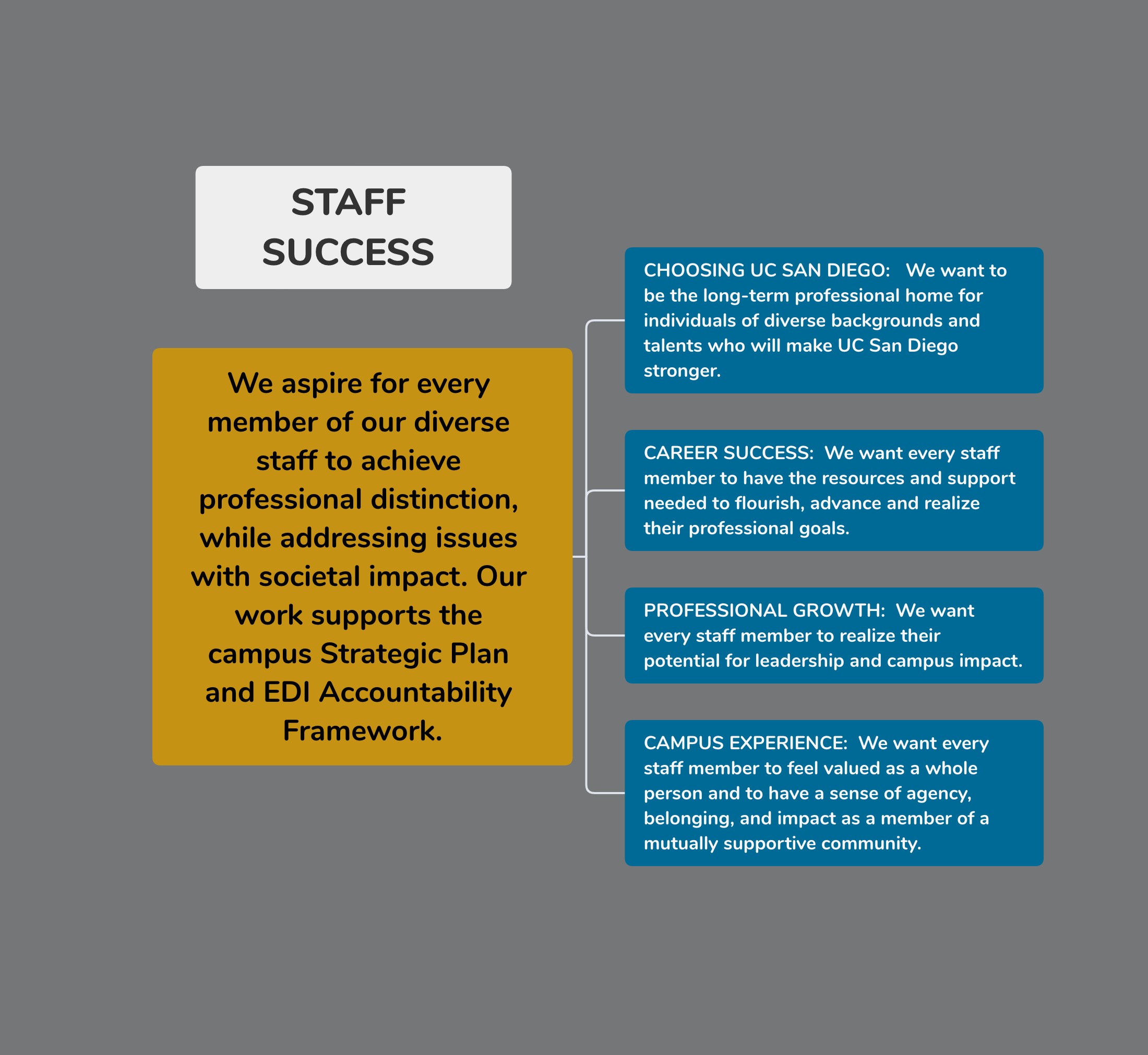
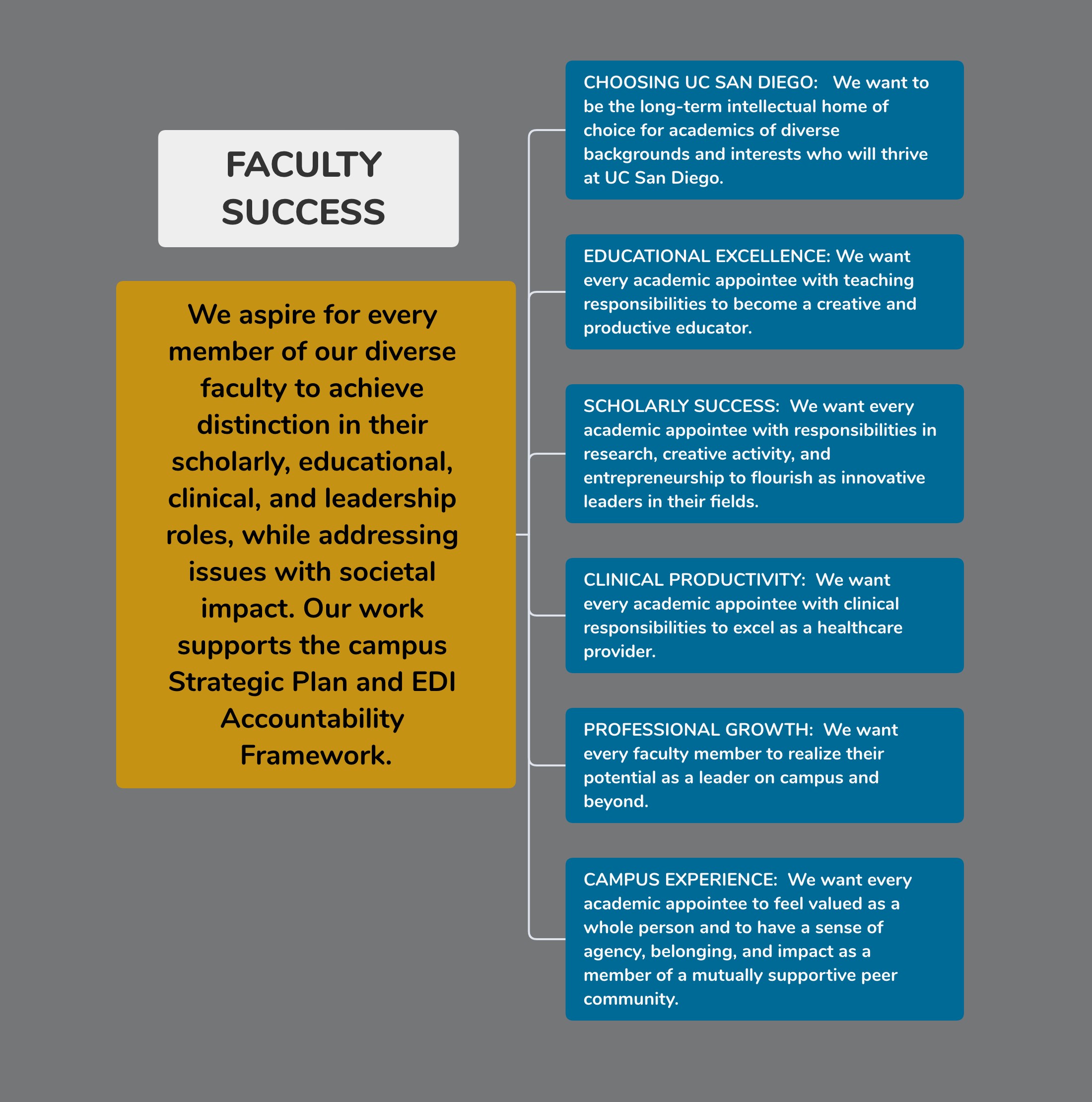
At a more granular level, the group also took a deeper dive into one aspiration for our students: timely graduation; the infographic linked below summarizes the array of methods university partners have been using in recent years to address this complex issue.
The Center of Operational Excellence (COE) is an Academic Affairs resource center started by AVC Marie Carter-Dubois, promoting best practices in administrative processes. As a unit within the Office of the Executive Vice Chancellor for Academic Affairs, the COE will partner with divisional deans and assistant deans, professional schools, and Academic Affairs administrative units to remove barriers to their success. Further, the COE collaborates across UCSD Health Sciences, UCSD Health Systems and Scripps Institution of Oceanography (SIO) to promote best practices across the institution.
The data-driven, lean approach to problem solving focuses on reducing waste like unnecessary processing and movement, underutilizing talent, lengthy wait times, and defects caused by rework or incorrect information. Working with the COE will foster effective financial stewardship and drive continuous improvement in support of the academic mission of UC San Diego.
UC San Diego is committed to supporting our students in achieving their goals at the university and in their pursuits beyond graduation. Mentors — formal and informal — assist students in their success, connect students with campus resources, and serve to enhance student well-being. This support and engagement are crucial in the university's mission to embrace and epitomize student-centeredness.
As of fall 2021, just over 3,400 students are in mentor relationships, with more than 2,500 of those students being incoming, first-year and transfer students through the initiative's Mentor Collective program.
The Mentoring for All committee launched during Winter Quarter 2021 as one of the key elements of our university's initiative to erase opportunity gaps via a Collective Impact framework. The committee is dedicated to ensuring that every UC San Diego student who wants a mentor has access to a mentor.
The Mentoring for All initiative will:
Committee Members:
UC San Diego's Return to Learn response to the COVID-19 pandemic is a very good example of using a Collective Impact framework to tackle an emerging issue quickly and effectively.
Partners across the university -- individuals, initiatives, academic programs, administrative units - were all working toward commonly agreed upon goals to keep the learning happening and keep the campus community safe.
Working groups such as Emergency Operations, Events, Research Continuity, Educational Continuity, and Business Continuity redirected their meetings and efforts to work with across units to execute ideas and goals set forth by steering committees.
The Steering Committee structure included the COVID Monitoring Team (CMT), which conducts daily data assessment; the COVID Response Team (CRT), which advises whether rapid, substantial pivots are needed to keep campus operating; the Return-to-Learn Steering Committee (RTL Steering which makes policy recommendations based on data; and the Chancellor's Cabinet, which reviews CMT, CRT, RTLSC recommendations and advises the Chancellor on what actions to take.
The backbone of UC San Diego, which includes UC San Diego Health, the Office of Strategic Initiatives, Environmental Health & Safety, Procurement, the Registrar's Office and others, have always been in place, and served as the offices that provided experts and actions to support all of these efforts.
In 2018, we convened a steering committee charged with assessing all academic summer success programs and other transition enrichment programs. Based on the committee's findings, changes were made to streamline operational matters such as application processes, and align programming to maximize impact.
The Teaching + Learning Commons (commons.ucsd.edu) partnered with OASIS (oasis.ucsd.edu) to revamp Summer Bridge, a six-week transition program that provides students with the opportunity to earn college credit, develop skills for academic success, connect to university resources, and receive support throughout their first academic year at UC San Diego.
Undergraduate Research (UR) empowers students from diverse backgrounds to become integrated into the UC San Diego research community; UR staff and faculty partners provide undergraduates with opportunities to gain skills to be successful in their academic journeys and post-baccalaureate careers.
The Triton Research & Experiential Learning Scholars (TRELS) program is sponsored by the Council of Provosts of the Undergraduate Colleges at UC San Diego and the Office of Undergraduate Research (UR) . TRELS empowers students to pursue intellectual opportunities beyond the classroom, by providing support in the form of funding and mentorship.
At UC San Diego, our Assessment for Advancing Equity initiative brings together the Division of Undergraduate Education, the Teaching and Learning Commons, Institutional Research, faculty from academic departments and the Colleges, and other campus partners. Over the past six years, our focus has been on building a campus-wide culture and community around assessment. By aligning processes, language, and tasks across assessment, program review, and accountability reporting, we aim to streamline efforts and elevate the innovative work happening across campus. By bringing together faculty and assessment experts, we create a community around a common goal of using assessment to enhance academic achievement and equitable learning. This collaborative approach advances equity and continuous improvement in student success while reinforcing our commitment to rigorous standards and accountability.
We welcome everyone who is involved with or curious about assessment to join our community by sharing their practices or programs with us or formally joining an upcoming Assessment Learning Community cohort.